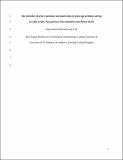Files in this item
The interplay of prior experience and motivation in great ape problem-solving (Gorilla gorilla, Pan paniscus, Pan troglodytes, and Pongo abelii)
Item metadata
| dc.contributor.author | Ebel, Sonja Jördis | |
| dc.contributor.author | Call, Josep | |
| dc.date.accessioned | 2018-09-13T16:30:06Z | |
| dc.date.available | 2018-09-13T16:30:06Z | |
| dc.date.issued | 2018-08 | |
| dc.identifier | 255619151 | |
| dc.identifier | df365afb-d1c9-4f81-9d17-67373902fa07 | |
| dc.identifier | 000440845200007 | |
| dc.identifier | 85046124007 | |
| dc.identifier | 000440845200007 | |
| dc.identifier.citation | Ebel , S J & Call , J 2018 , ' The interplay of prior experience and motivation in great ape problem-solving ( Gorilla gorilla , Pan paniscus , Pan troglodytes , and Pongo abelii ) ' , Journal of Comparative Psychology , vol. 132 , no. 3 , pp. 294-305 . https://doi.org/10.1037/com0000117 | en |
| dc.identifier.issn | 0735-7036 | |
| dc.identifier.other | ORCID: /0000-0002-8597-8336/work/47929001 | |
| dc.identifier.uri | https://hdl.handle.net/10023/16025 | |
| dc.description | This research was funded by Max Planck Society. | en |
| dc.description.abstract | Many primate species have a strong disposition to approach and manipulate objects in captivity. However, few studies have investigated what primates learn during free exploration of objects in the absence of rewards, and how previous problem-solving performance influences subsequent exploration. We confronted members of each of the four nonhuman great ape species (N = 25) with the collapsible platform task that required subjects to drop a stone inside a tube to collapse a platform and release a reward. Subjects received four successive sessions with an empty apparatus (exploration driven by intrinsic motivation) followed by four with a baited apparatus (problem-solving driven by extrinsic motivation) or vice versa. Apes who first faced an empty apparatus solved the task more quickly in the baited condition than apes who started with this condition. Moreover, apes starting with the baited condition took longer to collapse the platform in the first trial than apes who started with the empty condition. This study suggests that apes exposed to an empty apparatus before the test gain information that is later used to solve the task in a more efficient manner. Thus, apes learn about action-outcome contingencies during free exploration. Moreover, it indicates that the presence of food rewards distracts apes and delays problem-solving because apes' attention is mainly focused on the food. | |
| dc.format.extent | 12 | |
| dc.format.extent | 680559 | |
| dc.language.iso | eng | |
| dc.relation.ispartof | Journal of Comparative Psychology | en |
| dc.subject | Primates | en |
| dc.subject | Tool use | en |
| dc.subject | Prior experience | en |
| dc.subject | Intrinsic motivation | en |
| dc.subject | Exploration | en |
| dc.subject | Capuchin monkeys | en |
| dc.subject | Chimpanzee | en |
| dc.subject | Wild | en |
| dc.subject | Innovation | en |
| dc.subject | Behavior | en |
| dc.subject | Flexibility | en |
| dc.subject | Mechanisms | en |
| dc.subject | Hypothesis | en |
| dc.subject | Responses | en |
| dc.subject | QL Zoology | en |
| dc.subject | DAS | en |
| dc.subject.lcc | QL | en |
| dc.title | The interplay of prior experience and motivation in great ape problem-solving (Gorilla gorilla, Pan paniscus, Pan troglodytes, and Pongo abelii) | en |
| dc.type | Journal article | en |
| dc.contributor.institution | University of St Andrews. School of Psychology and Neuroscience | en |
| dc.contributor.institution | University of St Andrews. Centre for Social Learning & Cognitive Evolution | en |
| dc.identifier.doi | 10.1037/com0000117 | |
| dc.description.status | Peer reviewed | en |
| dc.identifier.url | https://doi.org/10.1037/com0000117.supp | en |
This item appears in the following Collection(s)
Items in the St Andrews Research Repository are protected by copyright, with all rights reserved, unless otherwise indicated.

